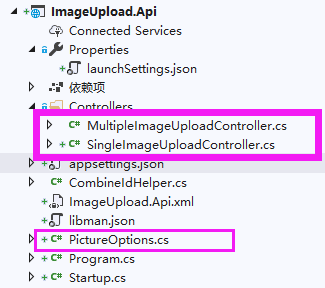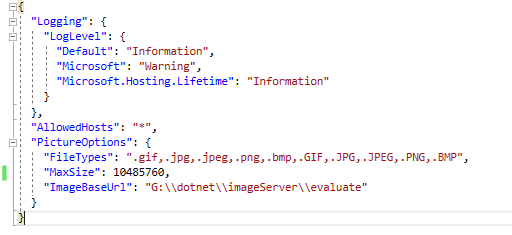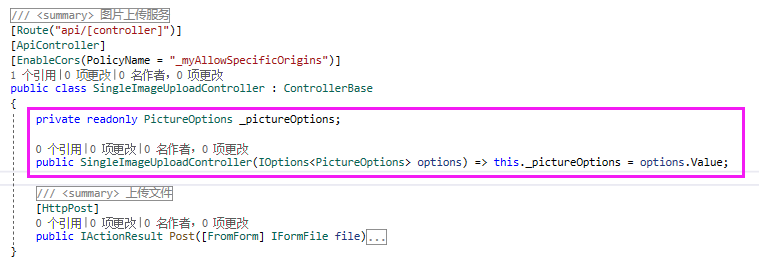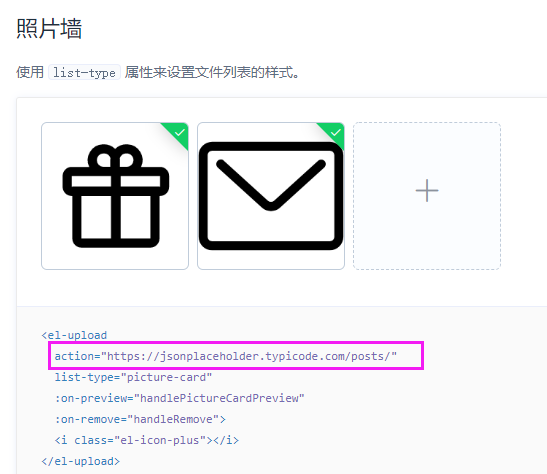.net core3.1 webapi + vue + element-ui upload组件实现文件上传
首先,先看我个人的项目结构。

这个webapi项目是专门作为图片上传的业务处理,而其中分为两个控制器:单图片上传和多图片上传。在接下来的内容主要还是针对单文件上传,对于多文件的上传,我暂且尚未研究成功。
其中pictureoptions类,由于我把关于图片上传相关的配置项(保存路径、限制的文件类型和大小)写在了配置文件中,所以接下来会通过依赖注入的方式,注入到这个类中
接下来,正式开工
第一步,配置文件的设置

"PictureOptions": { "FileTypes": ".gif,.jpg,.jpeg,.png,.bmp,.GIF,.JPG,.JPEG,.PNG,.BMP", "MaxSize": 10485760, "ImageBaseUrl": "G:\\dotnet\\imageServer\\evaluate" }
然后在项目根目录下新建PictureOptions类
public class PictureOptions { /// <summary> /// 允许的文件类型 /// </summary> public string FileTypes { get; set; } /// <summary> /// 最大文件大小 /// </summary> public int MaxSize { get; set; } /// <summary> /// 图片的基地址 /// </summary> public string ImageBaseUrl { get; set; } }
第二步,依赖注入

1 services.Configure<PictureOptions>(Configuration.GetSection("PictureOptions"));
在SingleImageUploadController中构造注入

这里要注意,你要把Cors跨域配置好,关于跨域,可以前往阅读我的另一篇博文
第三步,构建POST api
在element-ui中关于upload组件的api说明文档,可以发现一个非常重要的信息


upload组件他实际是通过提交form表单的方式去请求url
所以,后台这边,我们也是要通过form表单,获取上传的文件,具体代码如下:
/// <summary> /// 上传文件 /// </summary> /// <param name="file">来自form表单的文件信息</param> /// <returns></returns> [HttpPost] public IActionResult Post([FromForm] IFormFile file) { if (file.Length <= this._pictureOptions.MaxSize)//检查文件大小 { var suffix = Path.GetExtension(file.FileName);//提取上传的文件文件后缀 if (this._pictureOptions.FileTypes.IndexOf(suffix) >= 0)//检查文件格式 { CombineIdHelper combineId = new CombineIdHelper();//我自己的combine id生成器 using (FileStream fs = System.IO.File.Create($@"{this._pictureOptions.ImageBaseUrl}\{combineId.CreateId()}{suffix}"))//注意路径里面最好不要有中文 { file.CopyTo(fs);//将上传的文件文件流,复制到fs中 fs.Flush();//清空文件流 } return StatusCode(200, new { newFileName = $"{combineId.LastId}{suffix}" });//将新文件文件名回传给前端 } else return StatusCode(415, new { msg = "不支持此文件类型" });//类型不正确 } else return StatusCode(413, new { msg = $"文件大小不得超过{this._pictureOptions.MaxSize / (1024f * 1024f)}M" });//请求体过大,文件大小超标 }
第四步,配置前端vue项目
<el-upload action="http://192.168.43.73:5008/api/SingleImageUpload" list-type="picture-card" :on-preview="handlePictureCardPreview" :on-remove="handleRemove" :on-success="handleUploadSuccess" :on-error="handleUploadError" > <i class="el-icon-plus"></i> </el-upload> <el-dialog :visible.sync="dialogVisible"> <img width="100%" :src="dialogImageUrl" alt /> </el-dialog>
然后是method
data () { return { dialogImageUrl: '', dialogVisible: false, images: [] } }, methods: { handleRemove (file, fileList) { this.images.forEach((element, index, arr) => { if (file.name === element.oldFile.name) { arr.splice(index, 1) } }) console.log(this.images) }, handlePictureCardPreview (file) { this.dialogImageUrl = file.url this.dialogVisible = true }, handleUploadSuccess (response, file, fileList) { console.log(response) console.log(file) console.log(fileList) this.images.push({ newFileName: response.newFileName, // 服务器端的新文件名,即后端回调过来的数据 oldFile: { name: file.name, // 上传之前的文件名,客户端的 url: file.url // 页面显示上传的图片的src属性绑定用的 } }) }, handleUploadError (response, file, fileList) { this.$message.error(JSON.parse(response.message).msg) } }
这里面注意各个handle中频繁出现的三个参数:response 、 file 和 fileList
其中response,就是后端发送过来的数据
file:单文件上传时,他包含了该文件所有信息
fileList:指的是多文件上传所包含的文件信息

